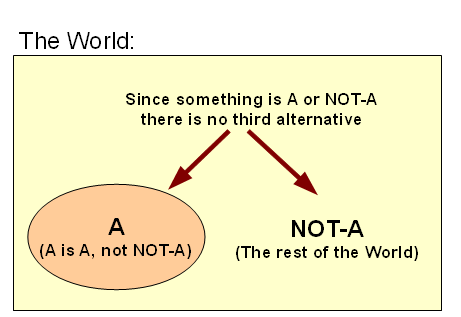The list of fallacious darwinist rhetorical resorts continues to grow day by day.
The one I now headline turns on a failure to realise that each of us is personally accountable before the truth and the right, and so should seek to make sure that he is correct, regardless of anyone else being able to rebut or dismiss.
And recall, this tactic is being used in the teeth of the LOI, LNC, LEM cluster, i.e. self-evident first principles of right reason that only the stubbornly irrational will dismiss:
_____________
>> . . . as for the you don’t know how to reply rhetorical gambit [remember you are objecting to self evident truths], here is the real problem, per Robert L. Kocher:
suppose that I say that the red pen I happen to have in my hand at this moment is a red pen. Further suppose that someone else says it is not a red pen, but is instead a flower pot, or a suitcase or a TV set. As a practical matter, I am unable to refute the assertion that what I am holding in my hand is not a flower pot. That does not mean that I’m incorrect when I say that it is a red pen. Nor does it mean that I am intellectually weaker than the other person who is arguing that it is not a red pen. Nor does it mean that his assertion that it is not a red pen is correct.
It means that I have no stronger argument than the red pen being in my hand. There is no stronger argument possible than the simple fact of the red pen being in my hand. No stronger refutation of the other person’s arguments is possible. At some point there must be agreement on what constitutes basic reality . . . .
It has become common for people who routinely engage in chronic psychotic levels of denial to consider themselves as being mental powerhouses, and to be considered by others as being mental powerhouses, because no one can break through their irrationality. This is often supported by a self-referencing congratulatory inner voice which says, “(guffaw) He REALLY didn’t have an answer for that one!” And they are correct. He didn’t have an answer.
Other than of course to shake his head sadly at clinging to absurdity.>>
_____________
Let me repeat from a few moments ago:
The Law of Identity, Law of Non-Contradiction and Law of the Excluded Middle are not on trial, we are.
For starters, consider:
 The simple act of recognising distinct identity of an entity A, say a bright red ball on a table:
The simple act of recognising distinct identity of an entity A, say a bright red ball on a table:
. . . provides a world partition W = {A|~A}
Instantly from this,
I: (A => A) = 1, i.e. A = A, LOI
II: x in W such that x is (A AND ~A) = 0, i.e. NOT (A and ~A), LNC
III: x in W is such that x is in A X-OR ~A, i.e. x is A or else ~A, not in both or neither; the dichotomy imposed by distinct identity is not a fuzzy border, LEM
Those, or their equivalents, cannot but be plain to the reasonably informed and experienced person. And, by their nature such are certain and not open to change, where also the attempted denial ends in immediate patent absurdity.
To try to gloat in the teeth of such, that you don’t know how to rebut (as though that absolves one of responsibility before truth and right), sadly, speaks for itself. Speaks in a way that is ripe for headlining.
And, on other topics, if we deal with one who struggles with self evident first truths of reason we cannot expect such a one to soundly handle ontological and moral reasoning that bridges the IS-OUGHT gap, the chaining of warrant and cause and other things of more difficult thought. (And, such a one is very likely to not even recognise the difference between the rhetorical and the dialectic. After all, s/he has already plainly chosen to cling to absurdity rather than acknowledge the self evident first principles of reason.)
One must creep before one can walk much less run. END
